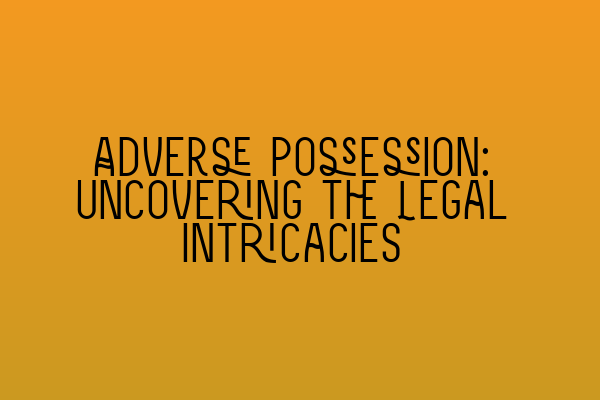Adverse Possession: Uncovering the Legal Intricacies
Welcome to SQE Property Law & Land Law, where we delve into the complex world of property law. In today’s blog post, we shine a spotlight on one of the most fascinating and intricate areas of property law – adverse possession.
What is adverse possession? Well, imagine this scenario: You purchase a property, and after a few months, you discover that your neighbor has been using a small portion of your land for their own purposes for over a decade. It may sound surprising, but such situations are not uncommon. Adverse possession refers to the legal principle that allows someone to claim ownership over another person’s land through continuous occupation and use, without the original owner’s permission.
Now, you might be wondering how someone could possibly claim ownership over someone else’s property. It all comes down to certain legal requirements that must be met for adverse possession to be successfully claimed. Let’s explore some of these requirements:
1. Actual Possession:
The person claiming adverse possession must physically possess and occupy the land. Merely having a legal title to the property or paying property taxes is insufficient. They must use the land as if it were their own, without interruption, for a specified period of time.
2. Open and Notorious:
The occupation must be visible and obvious to anyone who investigates the property. This means that the claimant cannot hide their possession or use the property in secret. It must be clear to the world that they are occupying the land without permission.
3. Exclusive Possession:
The person claiming adverse possession must possess the land exclusively, meaning that no other individual or entity has a legal right to use or access the disputed area. This requirement ensures that the claimant has full control over the land they seek to possess.
4. Continuous Possession:
In most jurisdictions, the occupation must be continuous for a specified statutory period, which typically ranges from 10 to 20 years. Any interruption in possession during this period may derail a claim for adverse possession. However, the length of the required period may vary depending on the jurisdiction.
5. Hostile Possession:
Contrary to what the term might suggest, “hostile” does not necessarily mean aggressive or confrontational behavior. Instead, it refers to the possession being without the owner’s permission. The claimant must possess the land as if they were the true owner, disregarding the legal rights of the actual owner.
It is essential to note that adverse possession laws can vary significantly from one jurisdiction to another. Therefore, it is crucial to seek professional legal advice to understand the specific laws and timelines that govern adverse possession in your area.
Now you might be wondering why adverse possession even exists. Adverse possession serves as a mechanism to resolve longstanding disputes and prevent dormant claims from resurfacing after a significant period of time. It encourages landowners to be proactive in protecting their property rights and discourages negligence or indifference towards encroachments.
However, adverse possession is not a straightforward process. The legal intricacies involved can make it challenging to establish a successful claim. Different jurisdictions have different standards of proof, and the burden lies on the claimant to prove each requirement convincingly.
Considering the complexity of adverse possession cases, it is crucial to engage the services of a knowledgeable and experienced property law solicitor, like those at SQE Property Law & Land Law. Our team of experts understands the intricacies of adverse possession and can guide you through each step of the legal process.
It’s worth mentioning that adverse possession cases can be emotionally charged and lead to strained relationships between neighbors. Our professionals approach these cases with empathy and strive to find amicable solutions, avoiding unnecessary litigation wherever possible.
In conclusion, adverse possession is a fascinating area of property law that tests the legal system’s ability to balance the rights of property owners and the interests of claimants. If you find yourself embroiled in an adverse possession dispute, seek professional legal advice promptly.
If you have any questions regarding adverse possession or any other property law matter, do not hesitate to reach out to SQE Property Law & Land Law. Our team is always ready to offer sound advice and effective representation in all property-related legal matters.
Stay tuned to our blog for more in-depth discussions on property law topics. At SQE Property Law & Land Law, we have you covered!
